RF & Microwave Engineering Blog Posts
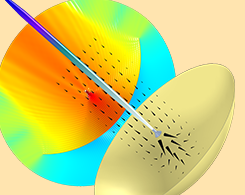
The Internet of Space Takes Off with Advanced Antenna Designs
You’ve heard of the Internet of Things, but what about the Internet of Space, which change how we share information and communicate worldwide. A key aspect of this concept: antenna designs.
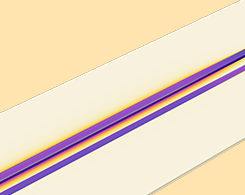
Analyzing Time-Domain Reflectometry for 2 Electrical Designs
Here are 2 examples of analyzing the signal integrity and time domain reflectometry in electrical devices: a high-speed interconnect and a set of parallel microstrip lines.
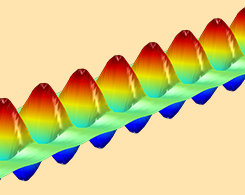
Simulating Extraordinary Optical Transmission at Terahertz Frequencies
One potential approach to improving medical imaging, quality assurance, and other terahertz applications is extraordinary optical transmission, a process that can be studied with RF simulation.
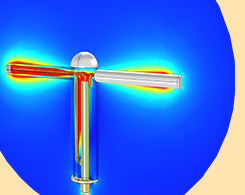
Optimizing the Geometry of Optical Antennas with Genetic Algorithms
What does antenna design have to do with the concept of natural selection? Although it may sound far-fetched, the basic principles of natural selection can be used to optimize antenna geometries.
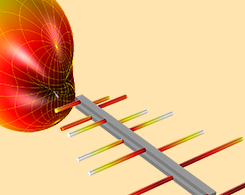
Designing Accurate EMC/EMI Testing Equipment with RF Modeling
EMI/EMC testing is used to ensure that various products, processes, and systems meet standard compliance requirements. RF modeling can be used to design equipment for accurate analyses.
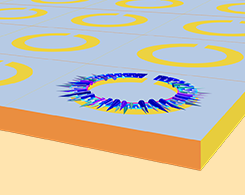
Streamlining the Design of Frequency-Selective Surfaces
If you want to improve the frequency response of a frequency-selective surface, you have many options for methods. 1 method streamlines what can be a complex process: simulation applications.
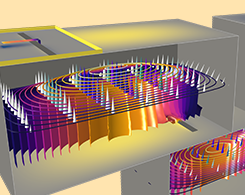
Introduction to Designing Microwave Circuits Using EM Simulation
When it comes to designing RF, microwave, and millimeter-wave circuits with electromagnetics simulation, the key is to start simple and gradually add complexity to your analyses.
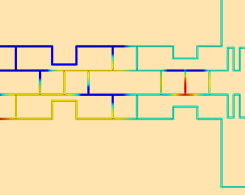
Designing a Butler Matrix Beamforming Network with RF Modeling
Check out a tutorial model with implications in developing the 5G mobile network: Butler matrix beamforming networks, which can be combined with phased array antennas for wireless communication.
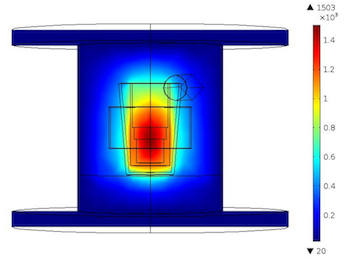
Optimizing Microwave Furnaces for Solar-Grade Silicon Production
For silicon to be considered “solar grade”, it has to be 99.9999% pure. Therefore, microwave furnaces used to produce solar-grade silicon need to be optimized for quality and efficient output.
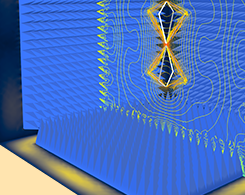
Faraday Cages Say ‘Do Not Pass’ to Electromagnetic Waves
Faraday cages are found in microwave ovens, protection suits worn by electrical line workers, and even novel “boxes” that are meant to eliminate distractions from cellphones and other devices.
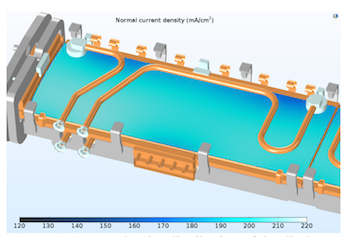
A Multilevel Approach to Modeling Planar Discharge in CO2 Lasers
Check out the multilevel approach to plasma modeling used by a researcher in the laser industry, who used the flexibility and functionality of COMSOL Multiphysics® to optimize a gas laser design.
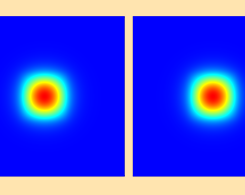
Analyzing the Design of a New Generation of Midinfrared Fiber Optics
Semiconductor simulation software is a promising method for advancing the design of midinfrared fiber optics because it can be used to measure propagation losses in the optical fibers.

Studying an Innovative Wireless Power Transfer Method with Simulation
Current wireless power transfer technology involves charging pads or stands. Disney Research is using simulation to investigate an innovative method called quasistatic cavity resonance (QSCR).
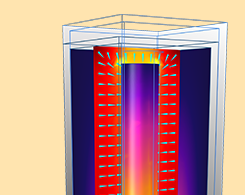
Predict Thermal Drift in Microwave Filters Using Multiphysics Simulation
When subjected to high-power loads and harsh environmental conditions, microwave filters can experience thermal drift. One way to predict this unwanted effect is with multiphysics simulation.
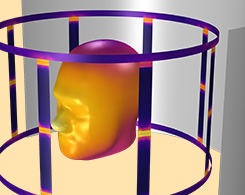
Designing and Optimizing MRI Birdcage Coils Using Simulation
An MRI birdcage coil should have an optimized magnetic field distribution around a patient’s head. Using RF simulation, we can design such biomedical systems.
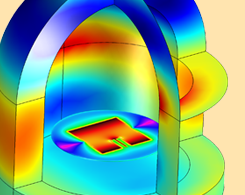
Assessing a Radome Design’s Ability to Improve Antenna Directivity
Bad weather and harsh environmental conditions can negatively effect antenna directivity, and in turn, wireless communication. Using simulation, you can design radomes that improve this quality.

Designing CSRR-Based Sensors to Monitor Chronic Kidney Disease
Chronic kidney disease can be effectively diagnosed, prevented, and treated through the use of noninvasive CSRR-based sensors. Researchers optimized the design of these sensors with simulation.
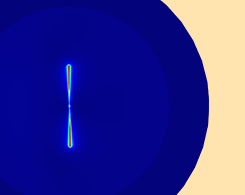
How to Couple a Full-Wave Simulation to a Ray-Tracing Simulation
Learn how to couple full-wave and ray-tracing simulations in a model with a nonhomogenous domain around the antenna. Part 4 of a series on multiscale modeling in high-frequency electromagnetics.
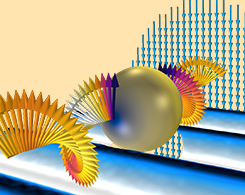
How to Couple Radiating and Receiving Antennas in Your Simulations
Learn how to couple radiating and receiving antennas in your simulations by using the scattered field formulation. Part 3 of a series on multiscale modeling in high-frequency electromagnetics.

2 Methods for Simulating Radiated Fields in COMSOL Multiphysics®
2 ways to model radiated fields: the Far-Field Domain node and the Electromagnetic Waves, Beam Envelopes interface. Part 2 of a series on multiscale modeling in high-frequency electromagnetics.
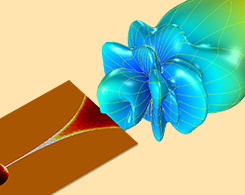
Introduction to Multiscale Modeling in High-Frequency Electromagnetics
Here’s an introduction to performing multiscale analyses of antennas and communication systems. Part 1 of a series on multiscale modeling in high-frequency electromagnetics.
Introduction to Efficiently Modeling Antennas in COMSOL Multiphysics®
Here’s your guide to efficiently modeling antennas using COMSOL Multiphysics® and the RF Module. An anechoic chamber, which is used to characterize antenna performance, is used as an example.

Autonomous Vehicles: Putting Technology in the Driver’s Seat
Explore the future of autonomous vehicles and the design challenges and technical considerations required to make them a viable option for the future of transportation.

Optimizing Phased Array Antenna Designs for 5G and IoT with Apps
Phased array antenna designs need to be optimized for the 5G mobile network and IoT. Simulation and apps can help streamline the development cycle of these wireless communication designs.
